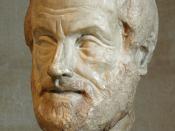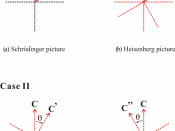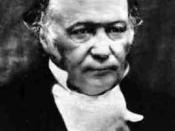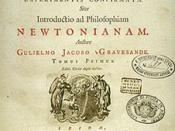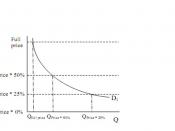Why? Explanatory power is something we value and desire... ...There are no explanations in science.
- C. van Fraassen Have you ever thought about the way your car works? The inner works of the engine, how does the fuel make it work, how does combustion lead to movement and is then passed to the wheels? If you have, what are you going to answer an 8-year-old kid when he asks: "Why does the car move?" Are you going to start explaining high school physics, mechanics, chemistry of combustion and the concept of friction? Or are you just going to say: "Well, the car eats up gas, and that makes the engine move the wheels." Granted, the latter doesn't explain much about what a car is. But it answers the question by the kid's understanding, doesn't it? The question is answered, the kid is happy, and you did not have to spend a few weeks introducing what you just said.
Some may argue that this is misleading, but despite the fact that when viewed generally, the simple answer might seem false or incomplete, in the context of the situation, it is quite adequate. That is what van Fraassen is trying to say with regard to scientific explanation.
According to him, there are two problems about scientific explanation. Both are very easily seen in our example. The first is, when is something explained? Some argue that we should not explain a phenomenon unless we have the full, unifying, true-to-the-last-miniscule-detail explanation, which will also cover all the cases which correspond to our case, cases similar to our case, or distant variants of our case. In short, what they want is a theory of everything, which in itself is a noble goal, but is hardy achievable. Let's face it, everything in our universe is connected in one way or another, or through one another, to everything else in it. A man bears definite connection to, for instance, "gas giant" type of planets. A reason for that could be, for example, that both share some mutual chemical elements. Does that mean that same theory should apply to prediction of man's movement as to a gas giant movement? As ridiculous as it sounds, this type of proposition often arises in science, though not as grotesque, but nevertheless as distant, for example, Theory of Relativity and the Quantum Theory. If a child would have been told to expect the same behavior from and ant and from and elephant, he would be quite confused. How do we then expect gigantic objects to obey the same rules as microscopic ones? While unification should be striven for, we should still, according to van Fraassen, explain something when, plainly, "we have a theory, which explains". That is to say, the theory does not have to be necessarily true; it does not have to be all covering either. As long as it has the explanatory power, in short, it works, it is good enough to answer our particular question. Take Newtonian mechanics. It is now known, that in essence, that theory is wrong. This knowledge, however, does not prevent us in the least from explaining phenomena, which can be explained therewith.
The second problem is why is explanation a virtue? Van Fraassen pragmatically rejects the view of some, that explanation is good just because it is, well, an explanation. Instead, he regards an explanation as an answer to a "why-question", and what makes that answer good (and thus is the virtue of the explanation) is its adequacy - the power of answering that question. Quite simplistic, no doubt, but according to van Fraassen, virtually any explanation can be put into the "Why-P [as opposed to X]" form, for which the answer, Q, follows. Though slightly awkward at first, this proposition, when thought about, makes a very good point. Consider the initial example with a car. A question such as "how does the car work?" can be broken down to question such as "why does the car move [and not stay]?"; "why does the car emit rumbling noise [and is not silent or emitting other types of noise]?" ; "why does the car require gas [and does not require anything else, or requires nothing at all] ?", and so on and so forth. Answering each of those questions fully does not require answering others in the bunch. This is van Fraassen's pragmatic view: we answer what we need to answer adequately, and that is it. As long as the fact is explained, explanation does not have to be the relation between the theory and the fact, and it doesn't have to even be accepted or true.
As acknowledged by van Fraassen, this view of explanation is not shared by some. For instance, according to Hempel, explanations absolutely have to be relevant (i.e. as exact as possible, for instance, to say that Pi is 3.14 is not really specific, but 3.1415926535897932384626433832795⦠is), and testable, which is included in van Fraassen's criteria of adequacy. Putnam's and Becker's view, formulated more precisely by Salmon, is that explanation is none but an exhibition of statistically relevant factors. This, however, creates a situation, in which we could theoretically answer any question with any answer within relevancy of that question. Let us say, having an adequate theory about a car movement, we could say that the car moves because it is made of metal. This would not be per se false, but certainly this is not an adequate answer. It is, however, relevant, and therefore fits into the view of explanation described above. The third standard view of explanation, voiced by Kitcher and Freidman, is that to explain is to unify our knowledge and understanding. The generalization tendency, as we've discussed earlier, is disputed by van Fraassen's pragmatic view. The reason is simple: we don't know everything. It would probably be safe to say that there is no field in science, where man had achieved complete knowledge. Even such basic, rudimentary fields such as arithmetics tend to surprise us sometimes. Therefore, unity is not possible, at least not now, and we have nothing to do but to answer the questions that we can answer. Modern science progresses in a few directions, one of them being unification of theories whenever possible, but even the most conservative scientist will agree, that if a phenomena can be explained with a completely unique (nevertheless correct) theory, it is far better to explain it using that existing tool we have, rather that leave it unexplained.
In the argument between the views of explanation discussed above, Van Fraassen parries the prejudices against the pragmatic view with blunt common sense. A widespread one is a claim that a usage of a theory to explain some phenomena must be justified by some necessary and sufficient conditions for why does that theory, indeed, explain it. A reply to that is quite simple - a theory, as we have already mentioned, does not have to be true at all. As long as it adequately explains, or in other words, answers our question "why", there is no reason not to use it. Again, Newtonian mechanics come to mind. Another prejudice is that explanatory power is the virtue of theories, i.e. the more a theory explains, the better it is. While true in general, no theory is good just because it is a correct theory. That is van Fraassen's answer - as stated before, explanation is not a virtue in itself; what we want is to explain something, answer a question, not just go on talking about some subject just because we like talking. By van Fraassen, an explanation needs to be adequate, and in a nutshell, that is all there is to it. Finally, the prejudice we are going to discuss last deals with causality: it states that explanations must involve causes, deal with the essence of the phenomena. This is the now classical month-long explanation about how does the car work to an 8 year old, who asked why does it move. Can Fraassen, very reasonably, reject causes, and refers to Aristotle's separation of explanations and demonstrations. Explanations answer a question "why", and that involves only one or very few causes. We do not dwell on the essence of an apple when asked what color it is. An apple is green because it is a Granny Smith apple, and quite doubtfully anyone would go into the chemical components causing the green color of the apple's skin, unless asked about it. Demonstrations, however, are proofs, and while also answering "why" questions, relate the causes to the essence of the phenomena, otherwise the proof is incomplete. A good example of this distinction would be the application of a simple logic rule (also known as De Morgan law), that (~A and ~B) is ~(A or B) and vice versa. We can say that ~(P and ~Q) is (~P or Q) because of De Morgan law, and that is sufficient for an explanation. Yet, if we were to rigorously demonstrate this without any initial assumptions, we would have to prove De Morgan law while at it, or our proof would be incomplete.
To conclude, Van Fraassen's idea of explanation is that which has no place in purely theoretical science, as he rejects the truth of theories as well ass their appeal to essence. An explanation's domain, according to him, is to be adequate in the context chosen by pragmatic factors, which are derived from the "why" question the explanation is called to answer. Surely, van Fraassen would not doubt for a second what to answer the kid who asked what is the reason his car moves.
